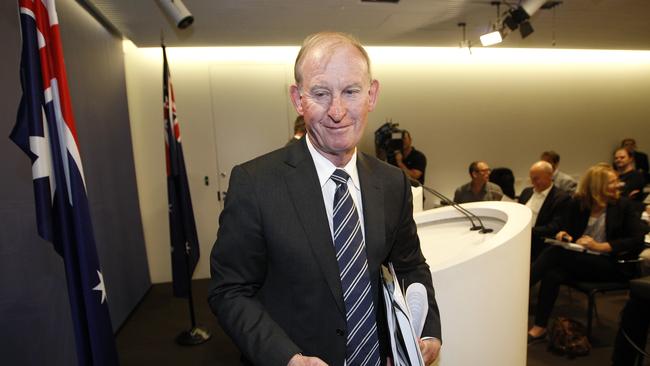Changes needed to protect economy, says David Murray
OUR terms of reference asked us to examine how Australia’s financial system can be positioned to support economic growth,

OUR terms of reference asked us to examine how Australia’s financial system can be positioned to support economic growth and meet the needs of end users. We’ve made 44 recommendations in the public interest to improve efficiency, resilience and fair treatment in the financial system as well as 14 observations for the tax White Paper.
I just want to lay out our recommendations in four areas. Firstly, on resilience, our work here reflected the lessons from the financial crisis and we’ve determined that given Australia’s position in the world, bank capital needs to be unquestionably strong on a global basis. This means the top 25 per cent in the world. We need to do this to strengthen our capacity to manage bank failures and reduce taxpayer exposure to the cost of bank recapitalisation, particularly in a crisis. These crises impose massive costs on economies and societies and the circumstances that assisted us during the recent global financial crisis will not be present in future crises.
Our recommendations on consumer outcomes reflect a view that disclosure and financial literacy are not sufficient for the system to work in the interests of consumers. This represents a paradigm shift for the system. We have recommended higher obligations on product manufacturers and distributors; our stronger regulatory framework and a more proactive regulator. This is designed to ensure that there are incentives for firms to improve their culture and fair treatment of their own customers.
FINANCIAL SYSTEM INQUIRY: Final report
Thirdly, with superannuation, we have recommended that there should be bipartisan support for a single objective of superannuation which focuses on retirement incomes and related to that, we have dealt with what we see as inefficiency in the system in the accumulation stage. In this area we have recommended that MySuper be replaced with a competitive mechanisms for allocating default members to the best funds, only if MySuper has failed to deliver significant fee reductions by 2020. This represents a challenge to the superannuation industry because we still believe that 120 basis points of average fees is too high and limits the accumulation over time.
We have also recommended that superannuation funds offer a retirement income product and together with our recommendations on fees, we believe that these two initiatives have the potential to increase retirement incomes by 25 to 40 per cent.
Lastly, we want to strengthen competition and innovation. In this area we have recommended that the risk weights for housing loans should increase so they are closer to the standardised risk weights used by smaller banks. This will strengthen competition in banking. There are also recommendations to strengthen the focus of regulators on competition and innovation, lower compliance costs and remove barriers to online distribution. In this area also, we have recommended changes to the card systems for card transactions so that surcharges are either eliminated or reduced and also that interchange fees can be reduced over time and we have made several recommendations to make life easier for small and medium enterprises.
Overall, we want Australia to have a very high quality financial system … one in which, in the event of a crisis which ultimately will happen again, we want the taxpayers off the hook as far as we can see.
This is an extract of David Murray’s comments on the presentation of the Financial System Inquiry final report.



